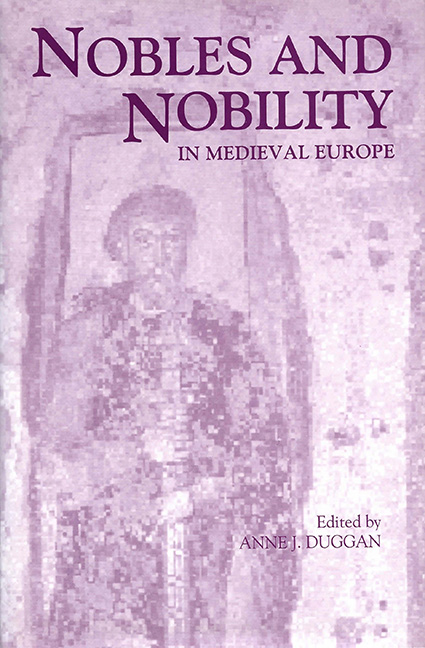 Nobles and Nobility in Medieval Europe
Nobles and Nobility in Medieval Europe Book contents
- Frontmatter
- Contents
- List of Illustrations
- Contributors
- Abbreviations
- Preface
- Dedication
- Introduction: Concepts, Origins, Transformations
- I Early Middle Ages
- II Central Middle Ages
- 7 Princely Nobility in an Age of Ambition (c. 1050–1150)
- 8 Words, Concepts, and Phenomena: Knighthood, Lordship, and the Early Polish Nobility, c. 1100 – c. 1350
- 9 Nobles and Nobility in the Narrative Works of Hartmann von Aue
- 10 A Noble in Politics: Roger Mortimer in the Period of Baronial Reform and Rebellion, 1258–1265
- 11 King Magnus and his Liegemen's ‘Hirdskrå’: A Portrait of the Norwegian Nobility in the 1270s
- III Late Middle Ages
- Index
7 - Princely Nobility in an Age of Ambition (c. 1050–1150)
from II - Central Middle Ages
Published online by Cambridge University Press: 25 October 2017
- Frontmatter
- Contents
- List of Illustrations
- Contributors
- Abbreviations
- Preface
- Dedication
- Introduction: Concepts, Origins, Transformations
- I Early Middle Ages
- II Central Middle Ages
- 7 Princely Nobility in an Age of Ambition (c. 1050–1150)
- 8 Words, Concepts, and Phenomena: Knighthood, Lordship, and the Early Polish Nobility, c. 1100 – c. 1350
- 9 Nobles and Nobility in the Narrative Works of Hartmann von Aue
- 10 A Noble in Politics: Roger Mortimer in the Period of Baronial Reform and Rebellion, 1258–1265
- 11 King Magnus and his Liegemen's ‘Hirdskrå’: A Portrait of the Norwegian Nobility in the 1270s
- III Late Middle Ages
- Index
Summary
Who could doubt that princes (principes) were noble in the eleventh and twelfth centuries? For admirers of their power to speak of the counts of Flanders as ‘noble (or ’most noble) prince’ looks on its face a redundancy. Yet the sort of semantic precision we delight in was no deterrent to writers of these post- Carolingian centuries, and it is probably no accident that they sometimes employed the superlative nobilissimus in reference to princes, dukes, and counts. For they more readily thought of nobility as attributive than as categorical, were eager to size people up (and down) qualitatively. Princes (that is principes, dukes and counts) were considered together with kings the ruling élite of Europe; and if their nobility was not exactly that of kings and queens, it lacked only the sacral attributes bestowed by consecration or coronation to distinguish it.
The regality of medieval princes has not been overlooked by historians. Charlemagne's concession of Aquitaine to Louis the Pious was an archetypal structure of power, still a kingdom in the ninth century before becoming one of a cluster of principalities in which the blood or imprint of an imperial aristocracy survived. Duchies or counties could be spoken of as kingdoms in the eleventh and twelfth centuries; one or two, like Bavaria, retained some privileges of early medieval monarchy. As to France, where the Capetian kings have been habitually viewed as the makers of central government, Karl Ferdinand Werner argued in an important article that the princes not only carried on in an ages-old programme of regalian power, but even had priority over the kings in devising administrative institutions.
Yet it seems likely that contemporaries experienced princely power not so much in its regality as in its nobility. And on this matter scholars have had less to say, probably because it is, and was, easy to muddle kingliness and nobility. What was, and is, understood by nobility could easily be reduced to qualitative attributes – birth, prowess, generosity, and the like – commonly shared by kings and lesser nobles. As set forth in chronicles, vitae, and chansons de geste, these attributes serve to define an aristocratic ethos that was abiding, yet inert.
- Type
- Chapter
- Information
- Nobles and Nobility in Medieval EuropeConcepts, Origins, Transformations (King's College London 1998), pp. 101 - 114Publisher: Boydell & BrewerPrint publication year: 2000


